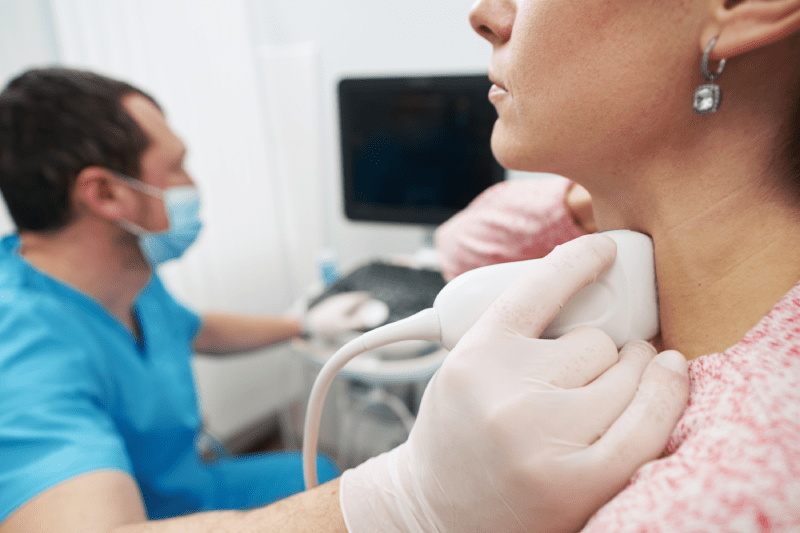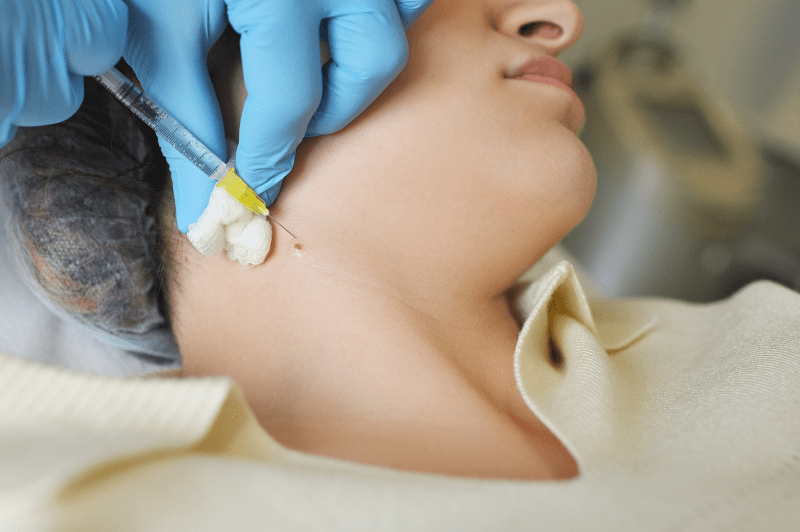What Is The Most Common Symptom Of Thyroid Cancer?
The most common symptom of thyroid cancer is the detection of a painless lump or nodule in the lower front part of the neck, where the thyroid gland is located. This nodule is often found incidentally during routine check-ups or imaging tests. Most cancerous nodules tend to be hard and fixed to the surrounding tissues, but this is merely an assumption; a definitive diagnosis is only established through fine-needle aspiration biopsy. This mass in the neck usually moves when swallowing. Rapid growth of the nodule or its starting to press on the vocal cords is considered a more advanced symptom and should be evaluated immediately.
What Does A Swelling Or Lump In The Neck Indicate?
A swelling or lump detected in the neck is called a thyroid nodule, and while this condition is very common, the vast majority of cases are benign. Only about 5% to 10% of thyroid nodules carry the risk of being cancerous. However, certain risk factors, such as the nodule being hard, having irregular borders, growing rapidly, causing swollen neck lymph nodes, or being found in men under 40, increase the suspicion of cancer. Therefore, every mass or swelling felt in the neck must be examined by a specialist using ultrasonography.
Are Voice Changes Or Hoarseness A Symptom Of Thyroid Cancer?
Yes, voice changes or persistent hoarseness can be a significant symptom of thyroid cancer because this condition may indicate that the cancer is pressing on or spreading to the recurrent laryngeal nerve (vocal cord nerve), which controls the vocal cords. The thyroid gland is located just behind the vocal cords. As the nodule grows or approaches the nerve, nerve function can be impaired, leading to voice weakness or permanent hoarseness. If such a voice change cannot be explained by reasons like a common cold, it should be urgently evaluated by an endocrine surgeon or an ENT specialist.
Why Does Difficulty Swallowing Occur?
Difficulty swallowing (dysphagia) occurs as a result of thyroid cancer physically pressing on the esophagus or windpipe (trachea). Since the thyroid is located directly in front of these two important structures, large and rapidly growing cancerous masses can compress these organs. This condition creates a sensation of difficulty swallowing, especially solid foods, or a feeling of something being stuck in the throat. Dysphagia is usually an indicator of advanced stage or larger tumors, and treatment planning should commence quickly to ensure the patient’s comfort.
How Is Neck Pain Or Discomfort Felt?
Neck pain or discomfort is a relatively less common symptom of thyroid cancer, but its presence may often indicate tumors that have spread outside the capsule or have grown large. This pain may radiate to one side of the neck (the side of the thyroid nodule) or towards the jaw or ear. The patient often complains of a constant pressure, fullness, or tension feeling in the front of the neck. Such persistent, non-resolving pain is not associated with normal thyroid conditions and should therefore be investigated immediately to rule out the possibility of cancer.
Do Thyroid Nodules Always Mean Cancer?
No, thyroid nodules do not mean cancer most of the time. The prevalence of thyroid nodules in the population is quite high, and nodules can be detected in more than half of individuals over 50 years old. 90% to 95% of these nodules are benign cysts or colloid nodules. Although sonographic features (smooth borders, cystic structure, hyperechogenicity) might suggest that they are benign, the only way to definitively determine if a nodule is cancerous is to perform a Fine Needle Aspiration Biopsy (FNAB). Therefore, it is important to seek expert opinion without panicking.
What Are The Signs That The Cancer Has Spread To The Lymph Nodes?
The most important sign that the cancer has spread to the lymph nodes is the presence of swollen and hard, non-mobile lymph nodes felt in the neck area (sides or under the lower jaw) on the same side as the thyroid nodule. Thyroid cancer, especially Papillary and Medullary types, tends to spread to regional lymph nodes. Ultrasonography is the primary method used to determine if these lymph nodes are cancerous. Although swollen lymph nodes are often caused by infection, in a patient with a thyroid nodule, this condition poses a high risk for cancer and requires a biopsy.
Does Early-Stage Thyroid Cancer Usually Cause Symptoms?
No, early-stage thyroid cancer usually does not cause any symptoms, and this is the biggest difficulty in early diagnosis. Very small cancerous nodules are not large enough to press on the vocal cords or cause difficulty swallowing, so they are not noticed by patients. Most early-stage thyroid cancers are detected incidentally when the patient undergoes an ultrasound for another reason (e.g., check-up, neck vessel examination). Therefore, it is vital that individuals with risk factors do not neglect regular thyroid check-ups.
Can A Cough Be A Symptom Of Thyroid Cancer?
Yes, especially a persistent and non-resolving cough can be a symptom of thyroid cancer. This cough is typically a dry cough not associated with an infection. It occurs as a result of the cancerous nodule or tumor growing and directly pressing on the windpipe (trachea), leading to irritation. The cough is often accompanied by shortness of breath (dyspnea). If the cough persists for more than 2-3 weeks despite traditional treatments and has no known cause like smoking, it should be investigated for thyroid compression.
What Systemic Symptoms Are Seen As Thyroid Cancer Progresses?
As thyroid cancer progresses and spreads to distant parts of the body (lungs, bones), systemic symptoms can be observed. These symptoms usually include complaints like unexplained fatigue, weakness, unintentional weight loss, and bone pain, depending on the site of metastasis. These systemic symptoms, especially in Papillary and Follicular cancers, indicate that the disease has reached an advanced stage and has become aggressive. In this situation, the treatment approach may shift from surgery to systemic therapies (smart drugs or immunotherapy).
What Is The Primary Cause Of Thyroid Cancer?
The primary cause of thyroid cancer is genetic mutations that occur in the DNA of thyroid cells, leading to uncontrolled growth. Most of these mutations are acquired, not inherited. While the exact trigger for these mutations is unknown, the strongest scientifically proven external cause is exposure to ionizing radiation. High-dose radiation therapy applied to the head and neck area, especially during childhood and adolescence, can dramatically increase the risk of thyroid cancer decades later.
Does Exposure To Radiation Cause Cancer?
Yes, exposure to ionizing radiation, in particular, significantly increases the risk of developing thyroid cancer. This risk is especially seen in radiotherapy treatments applied to the head, neck, or chest area during childhood (under 15 years old). Radiation exposure observed after nuclear accidents like Chernobyl or Fukushima also raises the risk. The radiation dose from medical imaging methods (X-rays, dental films) used for diagnosis or treatment is very low, so it does not carry a risk at this level, but unnecessary use should still be avoided.

Is A Family History Of Thyroid Cancer A Risk Factor?
Yes, a family history of thyroid cancer, especially if the cancer is seen in first-degree relatives (mother, father, sibling), is a significant risk factor for developing thyroid cancer. This may indicate a familial predisposition or, rarely, the presence of genetic syndromes following Mendelian inheritance rules. Especially in medullary thyroid cancer, a family history is almost always a risk factor and necessitates genetic screening (RET proto-oncogene analysis). Individuals with such a history should undergo regular thyroid follow-up.
How Does Age Affect The Development Of Thyroid Cancer?
Age affects the development of thyroid cancer in different ways. Papillary thyroid cancer is most commonly seen in individuals between 20 and 55 years old, and when observed at a younger age, the prognosis is usually better. However, if the cancer emerges after the age of 65, it tends to be more aggressive and may have a reduced potential to respond to treatment. Conversely, very aggressive and rare types like anaplastic thyroid cancer appear almost entirely in the advanced age group (generally over 60 years old).
Why Does Gender Carry A Higher Risk In Women?
Thyroid cancer is seen about three times more frequently in women than in men. The primary reason for this distinct gender difference is thought to be the interaction of female hormones (estrogen and progesterone) with thyroid cells. The hypothesis is that these hormones affect the growth and differentiation of thyroid cells. However, while the cancer is less common in men, when diagnosed, it tends to show a more aggressive course and have a worse prognosis compared to women.
Does Iodine Deficiency Or Excess Cause Cancer?
Yes, iodine imbalances can indirectly affect the development of thyroid cancer. Severe iodine deficiency increases the thyroid gland’s tendency to form nodules and specifically raises the risk of Follicular Thyroid Cancer. Conversely, some studies suggest that excessive iodine intake may increase the incidence of Papillary thyroid cancer. However, balanced iodine intake (such as using iodized salt) is accepted as critical for maintaining thyroid health. Iodine deficiency is no longer as widespread a problem in Turkey as it once was.
How Do Genetic Syndromes Increase The Risk Of Thyroid Cancer?
Some rare genetic syndromes dramatically increase the risk of thyroid cancer and usually cause it to appear in an early age and aggressive form. The most important of these is the Multiple Endocrine Neoplasia Type 2 (MEN 2) syndrome, which is associated with Medullary Thyroid Cancer (MTC). In individuals with this syndrome, cancer development is almost certain, and RET proto-oncogene analysis is mandatory for treatment planning. Genetic counseling and prophylactic (preventive) thyroidectomy may be necessary in cases with familial predisposition.
Does Hashimoto’s Thyroiditis Turn Into Cancer?
Hashimoto’s thyroiditis is a chronic autoimmune disease of the thyroid gland and does not directly turn into cancer. However, some observational studies suggest that the risk of Papillary Thyroid Cancer may be slightly higher in patients with Hashimoto’s compared to the general population. More importantly, the deterioration of the thyroid tissue structure due to Hashimoto’s can make it difficult to detect cancerous nodules with ultrasound. Therefore, stricter follow-up for nodules is recommended for patients diagnosed with Hashimoto’s.
Are Obesity And Diabetes Among The Risk Factors?
Recent epidemiological studies indicate that obesity and Type 2 diabetes are among the risk factors for thyroid cancer. High body mass index (BMI) can increase the risk of thyroid cancer development, especially in women. This condition is thought to be related to hormonal and metabolic factors, such as high insulin levels and chronic inflammation, associated with obesity. Maintaining a healthy lifestyle and weight control is an important part of reducing overall cancer risk.
What Is The Role Of Previous Head Or Neck Radiotherapy?
Previous radiotherapy applied to the head or neck area is the most well-known and strongest environmental risk factor in the development of thyroid cancer. Especially in individuals who received low-dose radiation for childhood acne or enlarged tonsils in the 1950s and 1960s, the cancer risk may become evident 10 to 40 years after exposure. Patients with such a history, even of low doses, should be monitored with regular lifelong thyroid ultrasounds and, if necessary, thyroglobulin follow-up.
Are Hormonal Factors Effective In The Development Of Thyroid Cancer?
Yes, hormonal factors play a significant role in the development of thyroid cancer, which is why it is more common in women. Estrogen and Progesterone hormones are thought to affect cancer development through receptors in thyroid cells. Furthermore, high levels of thyroid-stimulating hormone (TSH) can also promote the excessive growth of thyroid cells. For this reason, in the treatment of some patients with thyroid cancer, TSH levels are specifically suppressed to reduce the risk of disease recurrence.
Are There Environmental Toxins That Trigger Thyroid Cancer?
There are some environmental toxins thought to trigger thyroid cancer, but their effects other than radiation have not been clearly proven. Some research suggests that environmental chemicals such as pesticides and polychlorinated biphenyls (PCBs) may increase the risk by disrupting thyroid function or directly causing DNA damage. Such environmental exposures are a risk factor that needs to be considered, especially for individuals working in industrialized areas or certain occupational groups.
What Is The Most Common Type Of Thyroid Cancer?
The most common type of thyroid cancer is Papillary Thyroid Cancer, which constitutes approximately 80% of all cases. This type usually originates from thyroid gland cells (follicular cells) and generally grows very slowly. Papillary cancer tends to be seen more frequently in young adults (20-55) and has an excellent prognosis, especially when diagnosed at an early stage. Complete cure is usually achieved with surgery and, if necessary, radioactive iodine therapy. Although Papillary cancer tends to spread to lymph nodes, this spread can usually be successfully managed.

What Is The Treatment Success Of Papillary Thyroid Cancer?
Papillary thyroid cancer has the best prognosis among thyroid cancer types, and the treatment success rate is very high. The 5-year survival rate for early-stage and small tumors is over 98%. Successful surgery to remove all thyroid tissue (total thyroidectomy) is usually the first step. Radioactive iodine therapy (RAI) may be applied after surgery to destroy microscopic cancer cells that remain. Patients generally continue to have a normal life expectancy after treatment.
How Does Medullary Thyroid Cancer Differ From Other Types?
Medullary thyroid cancer (MTC) originates from the C cells that produce the hormone calcitonin in the thyroid gland, which distinguishes it from other types (Papillary, Follicular). MTC is not as common as Papillary cancer and tends to follow a more aggressive course. The most significant difference is that a large proportion of cases are genetic (MEN 2 syndrome). Calcitonin and CEA (carcinoembryonic antigen) levels are used in diagnosis, and radioactive iodine therapy is not effective in treatment. Therefore, only surgery to clear the tumor and lymph nodes is essential.
Why Is Anaplastic Thyroid Cancer The Most Aggressive Type?
Anaplastic thyroid cancer is the rarest and most aggressive of all thyroid cancers. It grows rapidly, has a high tendency to spread to surrounding tissues, and metastasizes early. It is generally seen in patients over 60 and is resistant to treatment (surgery, radiotherapy, chemotherapy). Due to its aggressive nature, life expectancy is short. Although treatment is often palliative (aiming to improve quality of life and reduce pressure), recent studies are underway to prolong lifespan with immunotherapy and smart drug combinations.
How Is Thyroid Cancer Diagnosed?
Thyroid cancer diagnosis usually begins with ultrasonography following the detection of a mass felt in the neck or a nodule found incidentally. Ultrasound evaluates the nodule’s size, borders, and features that carry a risk for cancer (microcalcifications, irregular borders). To make a definitive diagnosis from high-risk nodules, Fine Needle Aspiration Biopsy (FNAB) is performed. The pathological examination of the cell samples taken from the nodule confirms the cancer diagnosis, and treatment planning is initiated.
Which Test Determines If The Nodule Is Cancerous?
The test that definitively determines if the nodule is cancerous is the Ultrasound-Guided Fine Needle Aspiration Biopsy (FNAB). In this procedure, a very thin needle is used to take a cell sample from the nodule under ultrasound guidance. The collected cells are examined by a pathologist, and the presence of cancerous cells is investigated. FNAB results are the most critical and reliable diagnostic tool that determines the necessity of surgery and the type of surgery to be performed.
How Is Fine Needle Aspiration Biopsy (FNAB) Performed?
Fine Needle Aspiration Biopsy (FNAB) is an outpatient procedure performed while the patient is conscious and usually without the need for local anesthesia. An expert radiologist or physician enters the nodule with a very thin needle under ultrasound guidance and withdraws cell samples a few times. The procedure usually takes 15-30 minutes and causes minimal discomfort. The patient can return to their daily life immediately after the biopsy. Performing the procedure under ultrasound guarantees that the needle reaches the exact suspicious area.
What Is The Role Of Imaging Methods (Ultrasound, Scintigraphy)?
The role of imaging methods in thyroid cancer diagnosis is multifaceted. Ultrasonography is the primary tool that determines the presence, size, borders, and risk features of the nodule. Scintigraphy (Nuclear Medicine Scan) shows the nodule’s function (hot/cold); cancerous nodules are typically seen as “cold,” but this does not provide a definitive diagnosis. Additionally, Computed Tomography (CT) and PET-CT scans are used to determine the spread of cancer outside the thyroid or to distant organs (staging).
How Are Blood Tests Used In Thyroid Cancer Diagnosis?
Blood tests in thyroid cancer diagnosis are used to check thyroid function and markers for certain cancer types, rather than directly diagnosing cancer. TSH (Thyroid Stimulating Hormone) and Free T3/T4 levels are routinely measured. In cases of suspected or follow-up Medullary thyroid cancer (MTC), Calcitonin levels and rarely CEA are monitored. For the follow-up of Papillary and Follicular cancers after surgery, Thyroglobulin level is a fundamental marker used to check for recurrence.
What Features Do High-Risk Thyroid Nodules Have?
High-risk thyroid nodules have certain suspicious features identified in ultrasonography. These features include irregular or lobulated borders, hypoechogenicity (dark appearance), microcalcifications (small calcifications within), the nodule being taller than it is wide, and the nodule growing rapidly. Additionally, nodules in men under 40, those with a history of radiation, and those with a family history of MTC are considered higher risk and are usually evaluated immediately with biopsy.

Who Should Be Screened For Early Diagnosis Of Thyroid Cancer?
General population screening is not recommended for the early diagnosis of thyroid cancer, as most nodules are benign and could lead to unnecessary biopsies. However, screening high-risk groups is vitally important. These groups are: Individuals who received radiation to the head/neck area during childhood or adolescence, those with a family history of medullary thyroid cancer (MTC) or a genetic syndrome (MEN 2), and those who have a suspicious mass felt during a neck examination. These individuals need regular follow-up with thyroid ultrasound.
What Scans Are Required To Determine The Spread Of Cancer?
Various scans are required to determine the spread (staging) of thyroid cancer, depending on the type and risk of the cancer. Neck Ultrasonography first checks for spread to regional lymph nodes. If distant metastasis is suspected, Computed Tomography (CT) or PET-CT scans may be used. For Follicular and Papillary cancers, the Radioactive Iodine Scan (Whole Body Scan) is a critical tool for evaluating the status and spread of residual thyroid tissue after surgery and indicates treatment success.
What Is The Primary Treatment Method For Thyroid Cancer?
The primary treatment method for thyroid cancer is Surgery (Thyroidectomy), which involves the complete or partial removal of the cancerous thyroid tissue. The type of surgery to be performed (total or lobectomy) is determined by the size, type, stage of the tumor, and the patient’s age. For medullary thyroid cancer, in addition to surgery, the removal of lymph nodes where the cancer frequently spreads (neck dissection) is mandatory. Most patients continue their lives with thyroid hormone replacement after surgery.
When Is Radioactive Iodine Therapy Applied After Surgery?
Radioactive Iodine (RAI) therapy after surgery is generally applied to patients with Papillary or Follicular thyroid cancer who have a high risk of recurrence or who have spread outside the thyroid gland. RAI targets and destroys microscopic cancer cells or metastasized thyroid cells that could not be removed surgically. This treatment becomes more effective when the patient’s TSH level is elevated (hormone suppression) and is performed in a special nuclear medicine unit requiring hospital isolation.
What Are The Advantages Of Thyroid Cancer Treatment In Turkey?
The advantages of thyroid cancer treatment in Turkey include the combination of advanced surgical techniques (robotic/minimal invasive), high capacity of radioactive iodine treatment units, and cost advantage. Centers in Turkey hold international accreditations and are managed by experienced surgeons and endocrinologists. Treatment costs are generally 40% to 60% lower compared to Western countries. At the same time, the opportunity to start treatment quickly without long waiting periods is a critical advantage for international patients.
What Difference Does Robotic Surgery Make In Thyroid Surgery?
Robotic surgery makes a significant difference in thyroid surgery, especially in terms of aesthetics and minimal invasiveness. Instead of a traditional neck incision, the surgery is performed through hidden areas like the armpit or behind the ear. This means no visible scar remains on the patient’s neck. The robotic system provides the surgeon with high-resolution imaging and increased manual dexterity, allowing critical steps like nerve preservation to be performed more precisely. This improves both the patient’s recovery speed and satisfaction.
How Does Thyroid Cancer Treatment Cost Offer An Advantage In Turkey?
Thyroid cancer treatment costs in Turkey offer an internationally competitive advantage for both surgery and radioactive iodine treatment. Patients can save significantly on costs, especially regarding surgical fees, hospital stays, and follow-up costs, compared to procedures of similar quality in America or Europe. This cost advantage is provided without compromising treatment quality and allows patients to access treatment faster and more comfortably.
What Is The Long-Term Follow-Up Process After Treatment Like?
The long-term follow-up process after thyroid cancer is a critical process that continues lifelong and aims to minimize the risk of recurrence. Follow-up includes regular monitoring of thyroglobulin blood levels, TSH level suppression, and neck ultrasonography at regular intervals. Controls, which are more frequent in the initial years, are reduced to once a year as the risk of recurrence decreases. The correct dosing of thyroid hormone medication during this process is vital for the patient to ensure both cancer control and maintain metabolic health.
How Long Does Recovery Take After Thyroid Cancer Surgery?
The recovery time after thyroid cancer surgery depends on the surgical technique used. In surgeries performed with robotic or minimal invasive techniques, the patient usually stays in the hospital for 1-2 days and can return to light daily activities within a few days. In traditional open surgery, while the hospital stay is similar, full recovery and return to heavy activities due to the neck incision can take 2 to 3 weeks. Attention to doctor’s advice and voice rest is necessary to speed up recovery.
How Is The Risk Of Vocal Cord Paralysis Managed After Surgery?
Vocal cord paralysis is a rare risk that can occur as a result of damage to the recurrent laryngeal nerve during or after surgery. This risk is minimized by using nerve monitoring (NIM) technology during surgery. If paralysis occurs, it can often be temporary in the first few weeks and resolves with voice therapy. In cases of permanent damage, treatments such as injections or other surgical interventions (laryngeal surgery) are applied to improve voice quality.
When Is Immunotherapy Used In Thyroid Cancer?
Immunotherapy is generally a less common treatment method in thyroid cancer and is mainly used in advanced stages of differentiated (Papillary/Follicular) thyroid cancer that is resistant to radioactive iodine or in aggressive types like Anaplastic Thyroid Cancer. Immunotherapy works by activating the patient’s own immune system to fight the cancer, rather than directly targeting cancer cells. The treatment decision is made by examining the patient’s tumor for immunotherapy markers like PD-L1.
Does Size Alone Determine The Cancer Risk In Thyroid Nodules?
No, size alone does not determine the cancer risk in thyroid nodules. While nodules over 1 cm were previously considered riskier, microcarcinomas (cancers under 1 cm) are also commonly detected today. The cancer risk of the nodule is determined more by its ultrasonographic features (irregular borders, microcalcifications, hypoechogenicity) and the patient’s clinical risk factors (history of radiation, family history) than by its size. Very large nodules (over 4 cm) are important in terms of the necessity for surgery.
Is Complete Recovery Possible If Thyroid Cancer Is Caught Early?
Yes, complete recovery (full cure) is possible if thyroid cancer, especially the most common type, Papillary cancer, is caught in the early stages. Early diagnosis allows the cancer to be completely removed with surgery before it spreads outside the thyroid gland and to the lymph nodes. After successful surgery and radioactive iodine therapy if deemed necessary, the vast majority of patients live a cancer-free life. Therefore, awareness and regular follow-up are the key to the high success rate in this cancer.

Why Is Iodine Restriction Important Before Radioactive Iodine Therapy?
Iodine restriction before Radioactive Iodine (RAI) therapy is highly critical and directly affects the success of the treatment. The goal is to empty the normal iodine stores in the body so that the radioactive iodine given just before treatment is absorbed maximally by the remaining thyroid cells and cancer cells. The effectiveness of RAI depends on how eagerly the thyroid cells take up the iodine. This diet usually begins 1-2 weeks before the treatment and ends after the RAI dose is administered.
What Is The Purpose Of Suppressing The TSH Hormone In Thyroid Cancer Treatment?
The purpose of suppressing the TSH hormone in thyroid cancer treatment is to minimize the risk of recurrence. Thyroid cells, even if cancerous, are stimulated by TSH (Thyroid Stimulating Hormone), and TSH can promote the growth of cancer cells. Therefore, after surgery, patients are given thyroid hormone (Levothyroxine) supplements to keep TSH levels particularly low. This treatment not only replaces the missing hormone but also acts as a protective shield that prevents the growth of cancerous cells.
How Quickly Do Genetic Analyses Yield Results In Treatment In Turkey?
Genetic analyses required for thyroid cancer in modern oncology centers in Turkey (especially RET mutation or BRAF mutation) yield results quickly and at international standards. This speed is important for shortening the time to start treatment in genetically based types like Medullary thyroid cancer or for determining suitability for smart drug use in Papillary cancers. Fast genetic analysis results enable the personalization of treatment without delay.
What Should Be The Lifestyle Of Thyroid Cancer Patients?
The lifestyle of thyroid cancer patients should focus on supporting treatment compliance and long-term health. It is important to regularly take thyroid hormone and, if necessary, calcium supplements, eat a healthy and balanced diet (paying attention to iodine balance), maintain regular physical activity, and avoid stress. Even if the risk of recurrence is low, especially in Papillary and Follicular types, lifelong adherence to all follow-up protocols (ultrasound, blood test) determined by the physician is vital.
What Are The Smart Drugs Used In Thyroid Cancer Treatment?
Smart drugs (multikinase inhibitors) used in thyroid cancer treatment are generally used in advanced stages of differentiated thyroid cancer that is resistant to radioactive iodine or in advanced Medullary thyroid cancer. These drugs aim to stop tumor progression by blocking the growth signals and vascularization pathways of cancer cells. The decision to start smart drug treatment is determined by the tumor’s genetic and molecular characteristics and aims to improve the patient’s quality of life.
Is Voice Hoarseness Or Difficulty Swallowing Permanent After Surgery?
Voice hoarseness or difficulty swallowing after surgery can often be temporary. Swelling in the tissues near the thyroid gland or temporary nerve stretching during or after surgery can cause these conditions. Permanent hoarseness occurs with severe damage to the laryngeal nerve, and this risk is quite low in experienced centers. Temporary complaints usually resolve within a few weeks, and additional treatments like non-surgical voice therapy are applied for permanent issues.
What Supplements Are Needed After Thyroid Cancer Treatment?
Thyroid cancer treatment, especially after total thyroidectomy (removal of the entire thyroid gland) and radioactive iodine therapy, necessitates the use of certain supplements. The most important is the thyroid hormone replacement with Levothyroxine (lifelong). If the parathyroid glands were affected during surgery, calcium and Vitamin D supplements may also be needed. The dosages of these supplements must be regularly adjusted with blood tests to reduce the risk of recurrence and maintain the patient’s metabolic balance.
What Is The Active Surveillance Approach In Thyroid Cancer?
The Active Surveillance approach in thyroid cancer is applied to very small (usually under 1 cm), low-risk, and non-aggressive Papillary microcarcinomas. In this approach, instead of immediate surgery, the cancer is closely monitored with regular ultrasonography and physical examination. If the cancer begins to grow or spread, surgery is performed. This is a modern approach, especially applied in older age groups, aiming to avoid unnecessary surgery and treatment side effects.
What Are The Long-Term Advantages Of Receiving Thyroid Cancer Treatment In Turkey?
The long-term advantages of receiving thyroid cancer treatment in Turkey are that the patient achieves the best balance between treatment quality and cost. Successful surgery and advanced radioactive iodine therapy performed in internationally accredited centers guarantee high cure rates. Furthermore, Turkey’s geographical location and health tourism infrastructure offer easier and more economical access to long-term follow-up appointments, helping the patient maintain treatment compliance and quality of life for many years.
Thyroid cancer is a disease successfully managed with modern diagnostic and treatment methods. For a successful treatment journey, it is vital to have a personalized plan appropriate for the disease type, stage, and molecular characteristics. Advanced oncology and endocrine surgery centers in Turkey are capable of providing this plan at the highest standards.
To evaluate the most current surgical and radioactive iodine treatment options appropriate for your disease type, quickly create your personalized treatment plan, and benefit from comfortable health tourism services throughout the entire process, contact Cure Holiday. Confidently regain your health by receiving treatment in Turkey.
